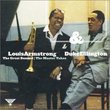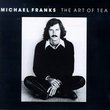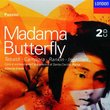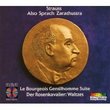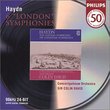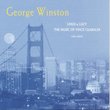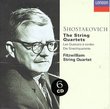| All Artists: Camille Saint-Saens, Myung-Whun Chung, Plácido Domingo, Waltraud Meier, Orchestre et choeurs de l'Opéra-Bastille, Jean-Philippe Courtis, Samuel Ramey, Alain Fondary, Daniel Galvez-Vallejo, François Harismendy, Christian Papis Title: Saint-SaŽns: Samson et Dalila / Domingo, Meier, Chung Members Wishing: 1 Total Copies: 0 Label: Angel Records Release Date: 2/16/1993 Genre: Classical Style: Opera & Classical Vocal Number of Discs: 2 SwapaCD Credits: 2 UPC: 077775447026 |
Search - Camille Saint-Saens, Myung-Whun Chung, Plácido Domingo :: Saint-SaŽns: Samson et Dalila / Domingo, Meier, Chung
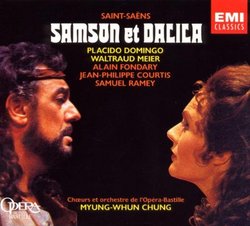 | Camille Saint-Saens, Myung-Whun Chung, Plácido Domingo Saint-SaŽns: Samson et Dalila / Domingo, Meier, Chung Genre: Classical
This CD offers tenor Placido Domingo in one of the best recordings of one of his best roles, in stirringly heroic voice as the headstrong Samson, and believable in his humiliation and regret at the end. Mezzo-soprano Wal... more » |
Larger Image |
CD DetailsSynopsis
Amazon.com essential recording This CD offers tenor Placido Domingo in one of the best recordings of one of his best roles, in stirringly heroic voice as the headstrong Samson, and believable in his humiliation and regret at the end. Mezzo-soprano Waltraud Meier is more than adequate as the temptress Dalila; as the High Priest, Alain Fondary is marvellously evil, and bass Samuel Ramey makes the most out of the minor role of the Old Hebrew. Myung-Whun Chung conducts with sensitivity, and lets us enjoy the kitschy splendors of the Bacchanale. --Sarah Bryan Miller Similar CDs
Similarly Requested CDs
|
CD ReviewsThe best Samson ever. Gerardo Cabrera Munoz | Mťxico | 01/05/2000 (5 out of 5 stars) "Samson & Delila has not been that lucky on records. The classic Vickers/Gorr recording is marred by Georges Prete's boring conducting and by a restricted sound recording. Not much can be said of later sets: Baremboim has a Boris Godunov instead of a Delila in Elena Obraztsova (a classic DG mistake of vocal casting); Christa Ludwig and James King are not very exciting in Giuseppe Patane's 1973 recording, and Carreras and Baltsa won't burn the house down either. But as so often in French opera, EMI had a great cast, a great conductor and they recorded the opera. From the very beginning, the orchestra alerts you that this is not going to be an oratorio-like reading. Myung Whun-Chung unfolds the drama with lethal imagination, and lets you hear wonderful things in this great score. By quite a distance, this is the best conducted Samson in the catalogue. Domingo in very good voice, is a noble hero, but it is the devastatingly erotic Delila of Waltraud Meier who steals the show. What a terrific performance! Sung in perfect French and in a velvet voice, no other mezzo who has recorded the role, even comes close. EMI sound picture is admirable, the more I hear this recording, the more I like it!" Extraordinary recording! J. Luis Juarez Echenique | Mexico City | 12/24/1999 (5 out of 5 stars) "Excellent as Domingo's Samson is, it is Waltraud Meier and Myung Whun-Chung who steal the show. The gorgeous German mezzo sings a ravishing Delilah, as fatale as femme fatales get, besides her French is virtually perfect. Myung Whun-Chung conducts a very exciting, very theatrical Samson. No other recording even comes close." Placido Domingo And Waltraud Meier Sizzle Rudy Avila | Lennox, Ca United States | 11/29/2005 (5 out of 5 stars) "This 90's EMI recording of Saint-Saens' most famous operatic work Samson et Dalila, still a popular opera in most companies, stars Placido Domingo and mezzo soprano Waltraud Meir. They are both mature, lyrically resplendent singers who not only sing beautifully and with gusto, but live their characters as well. Certainly, Domingo knew how to live each of his roles. Singing in his later years, his voice is dark, masculine, still lyrically strong and his high register is still above the staff and above the orchestra. His French diction is superb. As Samson, he seems to take on a Wagnerian hero approach. Samson, a Hebrew Old Testament version of Hercules, is a man whose heart is in the right place and attempts to save his people from the wicked pagan Phillistines. His one weakness: the beautiful and seductive Dalila. The true measure of a great Samson et Dalila lies in the vocal prowess of the lead tenor and mezzo, not to mention a good conducting of the score. While Chung may not be an especially striking conductor, this recording is blessed with the talents of Domingo and Meier. Meier is acclaimed for her Wagner (Isolde, Bragaine) and her Mozart repertoire (Despina, Elvira, Cherubino) her voice is strong in the middle register and velvety in the higher register. She is an appropriately seductive and sensual Dalilah, though I would also have enjoyed Grace Bumbry or Shirley Verrett, if both these singers could have for once been pulled out of retirement to sing opposite Placido's excellent Samson. This is a fine recording with great moments. Even the wonderful Samuel Ramey sings a particularly brilliant High Priest. I recommend you listen to the following highlights- the opening chorus, Samson's arias (all of them) and Dalilah's "Samson, Recharce Ma Presence", an unbeatable rendition on this recording."
|

 Track Listings (13) - Disc #1
Track Listings (13) - Disc #1



